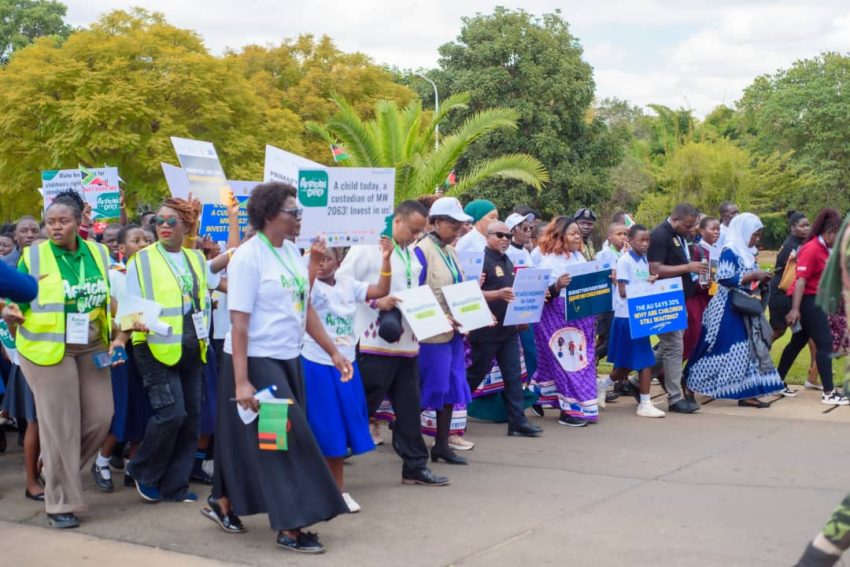Child-focused civil society organizations (CSOs) and non-governmental organizations (NGOs) have asked the Government of Malawi and other African Union (AU) Member States to prioritize children in their national budgets.
Speaking on behalf of the CSOs and NGOs at the commemoration of the Day of African Child in Lilongwe on Monday, Save the Children Malawi Country Director, Bhekimpilo Khanye — also emphasized the need for governments to develop and implement child-specific budget indicators and a publicly accessible tracking system to monitor funding.
Malawi’s State Vice President Dr. Michael Bizwick Usi presided over the event as the Guest of Honour.
Khanye, while commending the Government of Malawi for including children in budget formulation, expressed concern with their (children) ‘weak’ participation in monitoring and implemention thereby reducing accountability and the delivery of services.
“Children are not passive beneficiaries — but rights-holders and active stakeholders. Without their meaningful participation, we cannot realize their full potential,” he said, adding that enhanced budget monitoring and implementation is critical in ensuring that governments prioritize and effectively utilize resources for the children’s well-being.
The organizations further asked the governments to establish a dedicated budget line for disability-inclusive programs, and ensuring access to assistive devices, trained special needs educators and accessible infrastructure for children with disabilities.
They also appealed to the governments to roll out education curricula that incorporate human and children’s rights awareness — strengthening understanding and reducing violations stemming from a lack of knowledge.
“We also call upon the Governmen fof Malawi and other AU Member Sttes to:
· Increase domestic financing for children, strengthen partnerships with civil society organizations, and explore innovative financing mechanisms, such as social impact bonds.
· Integrate governance, child rights, and participation into the national school curriculum to empower future leaders.
· Strengthen regional cooperation and coordination among SADC member states to share best practices and collectively make progress.
· Align domestic laws and policies with regional and international commitments to aid their effective implementation.
· Establish robust monitoring and evaluation mechanisms to track progress and identify gaps.
· Support citizen-led monitoring, ensuring children and communities are involved in following up on delivery.
· Institutionalize mechanisms for children’s meaningful participation in all stages of the budget process — from formulation, implementation, to oversight.
· Recruit and deploy trained Child Officers in every council to oversee policy implementation.
· Develop child-specific, resilient, shock-proof interventions and budgets — to enable children to cope with climate-related crises and other disasters — ensuring their education, health, and well-being are not disrupted.
· Accelerate implementation of the Protection Policy — extending its reach and funding to more vulnerable children across all districts.”
On a positive note, the organizations have commned the Governmenf of Malawi and other African countries for the strides they have made in upholding and protecting the rights of children.
They cited the increase in school enrolments following the removal of school fees; expansion of social protection programs for vulnerable children and families; and enactment of progressive child legislation, the Child Care, Protection and Justice Act and the amended Education Act in Malawi — just to mention a few.
The organizations also recognized the space children have been given to speak on issues that affect them through child parliaments, child corners among others.
However, the CSOs and NGOs observed that there are still holes the governments need to patch in order to achieve a child-friendly Africa.
Among others, the organizations said they were concerned with the absence of clear, child-specific indicators to measure progress — without them, we cannot track funding, delivery, or impact on children’s well-being.
“Children with disabilities face systematic exclusion due to lack of assistive devices, trained special needs teachers, and accessible infrastructure — perpetuating their marginalization. Essential programs for children suffer from chronic underfunding or reliance on short-term, donor-dependent funding — threatening their long-term impact.
“Good governance starts with education, yet Malawi’s Basic and Secondary School curricula lack sufficient emphasis on children’s rights and civic participation — depriving future generations of the knowledge and skills to hold their leaders accountable. Although Malawi has ratified many international and regional instruments — their implementation is slow, affecting children’s rights in practice. The Ministry of Gender and local councils do not have dedicated budget lines for child-related interventions — making it difficult to track funding and measure its adequacy,” said Khanye.
He further stated that the absence of trained Child Officers in local councils further hampers implementation of child-focused programs, and that when disasters strike — floods, droughts, or cyclones — children suffer the most, yet budgets for these eventualities remain weak and vulnerable.




